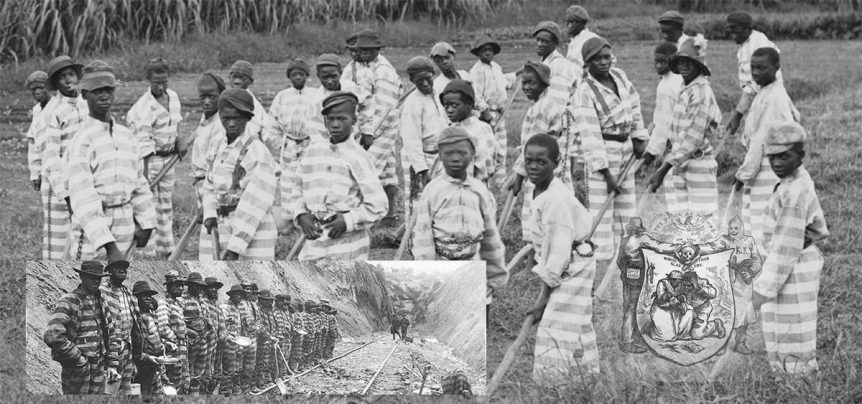Please Share This Article on Social Media 😐
Black Codes and Pig Laws
August 2020
Immediately after the Civil War ended, Southern states enacted “black codes” that allowed African Americans certain rights, such as legalized marriage, ownership of property, and limited access to the courts, but denied them the rights to testify against whites, to serve on juries or in state militias, vote, or start a job without the approval of the previous employer. These codes were all repealed in 1866 when Reconstruction began.
But after the failure of Reconstruction in 1877, and the removal of black men from political offices, Southern states again enacted a series of laws intended to circumscribe the lives of African Americans. Harsh contract laws penalized anyone attempting to leave a job before an advance had been worked off. “Pig Laws” unfairly penalized poor African Americans for crimes such as stealing a farm animal. And vagrancy statutes made it a crime to be unemployed. Many misdemeanors or trivial offenses were treated as felonies, with harsh sentences and fines.
The Pig Laws stayed on the books for decades, and were expanded with even more discriminatory laws once the Jim Crow era began.
Upon Closer Examination
On 5 April 1876, in its first session after the end of Mississippi’s Reconstruction government, the state legislature revised the state’s criminal code. The new law lowered the dollar threshold for what constituted grand larceny, an offense punishable by up to five years in prison, from twenty-five dollars to ten dollars. More drastic still, the law provided that stealing “any hog, pig, shoat, cow, calf, yearling, steer, bull, sheep, lamb, goat or kid, of the value of one dollar or more” would be punished as grand larceny. This provision gave the statute its common name, the Pig Law; made the law notorious; and earned it a prominent place in the mythology of Mississippi backwardness.
Slavery by a Different Name
The law was blatantly racist in its targeting of cattle and swine theft, because such stealing was stereotypically considered “Negro” behavior, and whites owned the preponderance of cattle and swine. Mississippi legislators sought to protect white property down to the most insignificant monetary value while denying basic civil liberties to blacks.
Yet contrary to the claims of several influential historians, the law had a negligible effect on the size of the state’s convict population. In 1947 Millsaps College historian Vernon Lane Wharton argued that the Pig Law caused the prison population to quadruple, that the law made the convict lease system a big business in the state, and that the law’s repeal (which he misdated to 1887) immediately resulted in a decline in the prison population and thus led to the demise of convict leasing. Although many southern historians, including Fletcher M. Green, David M. Oshinsky, and C. Vann Woodward, accepted Wharton’s claims, they suffered from serious logical and factual errors. First, Wharton based his sweeping conclusions on an extremely short-term correlation derived from mismatched data sources. Because there is always a lag time between a law’s passage and its effects in law enforcement, courts, and prisons, it is most implausible that a law passed in 1876 could quadruple the prison population by 1877. Increases in the convict population between 1874 and 1877 resulted primarily from other factors (most likely an 1875 law that legalized convict subleasing). Moreover, to support his hypothesis about a causal relation between this specific law and a rise in convict population, Wharton would have had to provide evidence that any population growth consisted chiefly of persons sentenced for grand larceny, but he did not furnish any crime or sentencing data on the issue. Moreover, data show that the convict population declined by half during the relatively brief period that the Pig Law was in effect—from 1,003 convicts in 1877 to 752 by 1883 to 499 in 1888, when the law was repealed. Finally, contrary to Wharton’s argument, Mississippi did not abolish convict leasing until 1907, nineteen years after the Pig Law’s repeal.
This is just one of many of the manifestations of white supremacy past and present. To this day the prison built in the era of maintaining the victims of pig law is the notorious Angola Plantation prison of Louisiana. Angola prison It is named “Angola” after the former plantation that occupied this territory. The plantation was named for the African country that was the origin of many slaves brought to Louisiana. Need I say More? ![]()
Suggest a topic or issue to InnerKwest℠. We will post your suggestion on our projects board que. Should a writer tag your suggestion for review, you may see the respective narrative published at the appropriate time as determined by the editor. Leave your suggestion at the comments section below.
Spread the word about InnerKwest℠.
Thank you for your interest!
InnerKwest™ will continually and conscientiously resonate a message of unity. We will not relent, digress, or vary from that message to any degree. Please sign-in below to leave questions or comments.
We always welcome constructive contributions and commentary.![]()
The writers and publisher of InnerKwest™, AMIBC™, and AMIBCNEWS™ strive to provide professional, positive, yet provocative narratives and opinions for edified consideration. Make sure to join the AMIBC Founders Club to maximize the total advantage of being a subscriber.
RedaJames Inc All Rights Reserved MMXXI
InnerKwest ™ ® & © 2004 – 2022
Powered By geekPut






